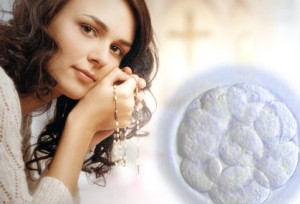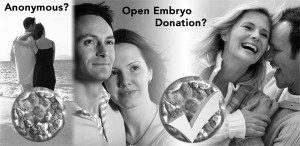Posts Tagged ‘embryo recipient’
Part 2: Disclosure from the Perspective of the Embryo Donor Offspring
This is Part 2 of the Disclosure From the Perspective of the Embryo Donor Offspring series. If you missed Part 1 and want to catch up, please scroll below or click here.
How Should Embryo Donor Offspring be Told About Their Origins?
 I wrote in the third segment of this blog series about the best time to disclose genetic identity to embryo donor offspring. I believe that disclosing this information before children are ten years of age may be far better than waiting until they are older, which significantly increases the probability they might be unsettled with the information (Mahlstedt PP, et al. 2010). One of the interesting themes in our surveys has been the consistent finding that the vast majority of respondents would want to know about their origins before age 12 with 91% (10/11) certainly before the age of 18. If Open-Identity were to be practiced in embryo donation, connections between the offspring and the donors may best occur far earlier than what is currently seen with adoption.
I wrote in the third segment of this blog series about the best time to disclose genetic identity to embryo donor offspring. I believe that disclosing this information before children are ten years of age may be far better than waiting until they are older, which significantly increases the probability they might be unsettled with the information (Mahlstedt PP, et al. 2010). One of the interesting themes in our surveys has been the consistent finding that the vast majority of respondents would want to know about their origins before age 12 with 91% (10/11) certainly before the age of 18. If Open-Identity were to be practiced in embryo donation, connections between the offspring and the donors may best occur far earlier than what is currently seen with adoption.
Experienced mental health professionals may prove invaluable in helping parents present this sensitive information. Reproductive endocrinologists well versed in this topic may also be very useful in deciding how and when to tell children. Forums where parents can discuss these issues with other parents who have experienced them may also be indispensible.
I soon will be reviewing a children’s book on this very topic, sharing my thoughts about it with my readers. So stay tuned.
What are the Long-Term Consequences of Disclosure?
Members of donor-linked families may have a significant mismatch regarding their levels of hope and expectation about contact (Scheib E, et al. 2008). Some of the participants may have a tendency to romanticize the first meeting and subsequent relationship. My simple recommendation at this time is to move slowly and carefully, without inappropriate expectations.
It is exceedingly important that the relationship between the parents who raised the child and the embryo donor offspring not be harmed, as this is the basis for the child’s stability and home life. The fear that this relationship will be damaged is one of the main reasons recipients prefer to not disclose.
Remember that little is known about long-term consequences following disclosure and the subsequent contact between embryo donor offspring and their genetic parents and siblings. The complex emotional interplay between embryo donor offspring and the parents who raised them, the embryo donors and the offspring’s genetic is completely unknown. This area of research is sorely needed.
In our most recent survey, 68% of the respondents would tell immediate family, their own children and their significant partners about their embryo donation origins. The only hesitancy involved friends with 40% (4/10) stating that they would not disclose. Once again, the long-term consequences of disclosure remain uncertain with some societies and religions perhaps being less than welcoming to an embryo donation-conceived individual. It would be irresponsible for us as clinicians to assume that all will go well. We must remain cautious and counsel our patients carefully and individually until we have more information to help guide them.
Will the Embryo Donor Offspring Be Hurt by Not Being Told?
Studies that have specifically examined the psychological well being of embryo donation offspring indicate that embryo donation families, independent of disclosure decisions, are faring well (MacCallum F, et al. 2007 & 2008). Warm parent-child relationships and positive child development have been documented although few of these donor embryo-conceived children have yet entered adolescence (Golombok S, et al. 2006). While more data and follow up studies are certainly needed, embryo donation children do not seem to be at increased risk for developing psychological problems during early and middle childhood, regardless of disclosure decisions. The children that were not told of their origin were do as well as those who were told.
Children whose parents do not tell them about their embryo donor origin cannot suffer from lack of disclosure. Whether the parents tell or not, there is research to show that embryo recipient parents may be more attentive and warm to their offspring than natural conception parents.
While not definitive, the research we have so far suggests that disclosure decisions, either for or against, will not cause irreparable harm to the embryo donor-conceived individuals or the parents who raise them.
Summary Comments
Currently, the legal rights of embryo donors and recipients override the strong desire of embryo donor offspring to learn more about or even meet their donors. There is a push to mandate disclosure, but the consequences in the world of embryo donation may be dire. It is quite likely that more embryos will be discarded or abandoned before donors will be forced into an open-identity process.
Using terms such as “mother” and “father” for those who raised the embryo donor offspring should be maintained. The terminology that is used to describe the embryo donors can get confusing. It is my personal choice, but “donor mom ” and “donor dad” seem the simplest and kindest to all.
Reproductive facilities need to prepare for disclosure requests and adhere to record retention guidelines, whenever possible, to avoid unfortunate lapses in information and potential legal consequences.
I understand a donor-conceived individual’s strong desire to know more about their donors. I believe that providing the donor’s medical, surgical, psychiatric, family and social histories is quite reasonable when disclosure occurs. However, providing actual identifying information needs to be handled carefully and thoughtfully. Impartial research to examine the long-term consequences of open-identity issues in embryo donation is sorely needed.
Since physicians take an oath to cause no harm, we all need a bit more information and guidance in caring for our patients, embryo donors and recipients. We must never forget, however, the embryo donation-conceived individuals, who were never our patients, are still owed thoughtful care and tremendous compassion. We have much to learn from them.
References:
Beeson DR, Jennings PK, Kramer W. Offspring searching for their sperm donors: how family type shapes the process. Hum Reprod. 2011 Sep;26(9):2415-24.
Daniels K. The controversy regarding privacy versus disclosure among patients using donor gametes in assisted reproductive technology. J Assist Reprod Genet. 1997 Aug;14(7)-373-5.
De Jonge C, Barratt CL. Gamete donation- a question of anonymity. Fertil Steril. 2006 Feb;85(2)-500-1.
Klock SC. The controversy surrounding privacy or disclosure among donor gamete recipients. J Assist Reprod Genet. 1997 Aug;14(7)-378-80.
Golombok S, Murray C, Jadva V, Lycett E, MacCallum F, Rust J. Non-genetic and non-gestational parenthood: consequences for parent-child relationships and the psychological well-being of mothers, fathers and children at age 3. Hum Reprod. 2006 Jul;21(7):1918-24.
Guido P. The reduction of sperm donor candidates due to the abolition of the anonymity rule: Analysis of an argument. J Assist Reprod Genet. 2001 Nov;18(11)-617-22.
MacCallum F, Golombok S, Brinsden P. Parenting and child development in families with a child conceived through embryo donation. J Fam Psychol. 2007 Jun;21(2):278-87.
MacCallum F, Keeley S. Embryo donation families: a follow-up in middle childhood. J Fam Psychol. 2008 Dec;22(6):799-808.pdf
Mahlstedt PP, LaBounty K, Kennedy WT. The views of adult offspring of sperm donation: essential feedback for the development of ethical guidelines within the practice of assisted reproductive technology in the United States. Fertil Steril. 2010 May 1;93(7):2236-46.
Ravitsky, V. & Scheib, J.E. (2010). Donor-conceived individuals’ right to know. Hastings Center Bioethics Forum 2010;40:(4).
Scheib JE, Ruby A. Contact among families who share the same sperm donor. Fertil Steril. 2008 Jul;90(1):33-43.
Shehab D, Duff J, Pasch LA, Mac Dougall K, Scheib JE, Nachtigall RD. How parents whose children have been conceived with donor gametes make their disclosure decision: contexts, influences, and couple dynamics. Fertil Steril. 2008 Jan;89(1):179-87.
Disclosure Issues From the Perspective of Embryo Donor Offspring
In an Open Embryo Donation procedure it is likely the embryo donor-conceived individuals will be told of their origin. In an anonymous procedure, however, it is up to the embryo recipient parent(s) to make disclosure decisions. Reproductive endocrinologists are normally focused on the donor’s and the recipient’s legal rights/rights to privacy and we probably loose sight of the offspring’s point of view. These next two segments will examine this potentially neglected perspective: those of the children and adults created through embryo donation.
Do Embryo Donor Offspring Have The Right to Know Their Origins?
 Many donor-conceived person feel they have a perceived right and a strong desire to know their genetic origins (Shehab D, et al. 2008). From an ethical perspective, these individuals feel disclosure of their true genetic origins involves principals such as honesty, trust and respect.
Many donor-conceived person feel they have a perceived right and a strong desire to know their genetic origins (Shehab D, et al. 2008). From an ethical perspective, these individuals feel disclosure of their true genetic origins involves principals such as honesty, trust and respect.
Embryo donors and recipients, who may prefer an anonymous process, seem to have rights that compete with those of the donor-conceived individuals. In reality, both embryo donors and recipients have legal rights that are in direct contrast to the offspring’s moral view that family secrets shouldn’t be hidden.
There is a very vocal and select group of egg and sperm donors who feel disclosure should be mandatory. It should be understood, however, that we are probably not hearing from those embryo donor-conceived individuals who have been told of their origins, but who are less vocal, perhaps feeling that disclosure should not be mandated or legislated. We simply do not know if this is a silent minority or majority.
In many ways, there is no easy way to reconcile these contrasting legal rights and moral perspectives. Most agree, at the risk of offending those who feel differently, that in society ruled by law, that a legal right ultimately trumps a perceived moral right. Thus, the legal rights of donors and recipients continue to prevail in this country.
That stated, if individuals are told they came from donated embryos, it is natural to expect they will want more information.
Why do Embryo Donor Offspring Want Disclosure?
While perhaps not directly comparable, those sperm and egg donor-conceived offspring who are seeking information about their donors often do so for the following reasons (Ravitsky V, et al. 2010 & Mahlstedt PP, et. al. 2010):
- Curious about donor physical characteristics and personalities
- Desire a better understanding of their own genetic identity
- Have medical concerns (medical, family and social history)
- Want to meet the donor
- Want to understand the motivations of the donors
- Want to provide an ancestral history for their own children
For children born to a single woman or a lesbian couple, finding out more about the donors may increase their sense of kinship. Open-identity systems are being driven forward, in part, through single women and lesbian couple donor sperm recipients. These recipients are also the most likely to disclose because their social situation essentially requires it.
For many, the search for their donors may go well beyond seeking just simple information. In two recent studies of offspring searching for their donor sperm fathers, with about half over the age of 18 and half under, between 80-88% were intensely curious about their donor and wanted to contact them. Up to one-third desired an actual relationship with the sperm donor (Beeson DR. 2011 & Bahlstedt PP, et al. 2010). It should be understood, however, that support group studies such as these might not represent a balanced patient sample. Donor offspring who are not bothered by the issue are less likely to seek information/support via the web and are, therefore, not enrolled in such studies. Interestingly, our recent survey on this same topic yielded nearly identical results with 82% (9/11) respondents wanting medical and/or identifying information on their embryo donors.
What do Embryo Donor Offspring Call Their Donors and Recipients?
Here are some terms commonly used to describe embryo donors and embryo donor recipients from the perspective of the offspring who have been told they were created though embryo donation:
|
Embryo Donors |
Embryo Recipients |
|
|
These important labels have emotional connotations and I have listed them here in my personal order of preference.
Are Reproductive Facilities Prepared for Disclosure?
In general, reproductive facilities may not be adequately prepared to handle embryo donation disclosure issues. Medical providers’ first reaction will be to protect their patients, the donors or recipients. Nondisclosure of medical information is actually required by state and federal statutes and clear consent must always be provided before medical/identifying information is released to any third party.
Most reproductive facilities are totally unaware of the adoption literature that universally advocates disclosure. Clinicians will want conclusive embryo donation studies before they will consistently recommend and comply with disclosure. They will also want to be insulated from any legal consequences should disclosure occur.
Most medical practices will be operationally challenged to have records available years after procedures are performed. Most states require medical records to be retained for seven years. The FDA requires charts involved with third party conception techniques to be kept for 10 years, while the ASRM suggests they be stored indefinitely. Being able to identify those particular charts from the others charts is a logistical challenge. In my practice, we color-code the charts involving any type of donor material, making them easy to pull and save.
In the case of natural disasters, paper charts may be destroyed. It is common sense that the medical practice should also save the information in electronic form with offsite back up. Keeping in mind that electronic document formats are constantly changing, we currently suggest documents be saved in the common “pdf” (Adobe Portable Document Format) file format, and keep the medical and identifying information separate.
I also feel embryo recipients have a responsibility to keep the information about their embryo donors protected and safe just in case the practice’s medical records are ever lost or deleted.
We will continue this discussion, on disclosure issues from the perspective of the embryo donor offspring, tomorrow. Included will be discussion of whether or not reproductive facilities are prepared for disclosure, long-term consequences and how to tell the offspring. The reference list will also be posted with the second half. Stay tuned!
Part 2: Disclosure from the Perspective of the Embryo Recipient
This is Part 2 of the Disclosure From the Perspective of the Embryo Recipient series. If you missed Part 1 and want to catch up, please scroll below or click here. In the week prior, we also covered the same disclosure issue but from the perspective of the embryo donor, scroll further down or click Part 1 and Part 2. More is yet to come in the two weeks ahead as we continue to evaluate this topic that is important to so many.
 When is the Best Time to Disclose Embryo Donation to the Child?
When is the Best Time to Disclose Embryo Donation to the Child?
If parents decide to disclose, it is seemingly better to do so earlier rather than later. Disclosing to a young child allows the child time to absorb the information. If disclosure occurs in adolescence or later, the young adult may feel mistrust, alienation, identity confusion, frustration and even hostility towards his or her family (Ethics Committee, 2004 & Mahlstedt PP, et al. 2010). About 46% of the donor sperm offspring who were told at the age of 18 or older stated they were confused about the disclosure. According to the research published, it seemed as though it was best to tell the child before the age of 10 because waiting doubled the number of children who were unsettled with the information.
How Often Do Offspring Inadvertently Discover Their Origins?
The most common reason for embryo recipients to disclose was a fear that the child would accidently discover the facts at a later date (MacCallum F, et al. 2007). When recipients are considering embryo donation, they commonly toss the idea around with friends and family. I urge caution here. The more people who know of their decision to be embryo recipients the greater the likelihood that offspring may discover their origins.
Even if the recipient parents keep the information to themselves, the children may still find out. One study of adult offspring of sperm donation found that about one-third of the individuals learned of their donor origins after an argument, from another person or they figured it out themselves (Mahlstedt PP, et al. 2010). In a recent study, about 10% (47/458) of the sperm donor offspring who were searching for their donors and half-siblings found out by accident (Beeson DR, et al. 2011). They either were apparently told by siblings, family or friends; discovered paperwork or unusual medical issues, overheard parents talking or learned as a consequence of divorce. Though sperm, egg and embryo donation procedures differ in many respects, when examining these two studies it is clear that there is a reasonable risk that the offspring will discover their origins even in the best of circumstances.
Are Embryo Donor Offspring Harmed by Non-Disclosure?
Interestingly, children do not seem to be harmed if disclosure does not occur. Also, if disclosure occurs early, neither the children nor the family seem to be harmed (MacCallum F, et al. 2007 & 2008).
Should Disclosure be Mandated?
Many hope that egg and sperm donation programs can move from strategies focused on compensation to a more altruistic perspective (Scheib JE, et al. 2008). Embryo donation is quite different since financial incentives, if they exist at all, are minimal and altruistic reasons for donating are currently the primary emphasis.
Unfortunately there is a much greater preference to discard or abandon embryos than to donate them. Placing any impediments to embryo donation, such as mandating disclosure, may not only reduce the number of embryos donated but will almost certainly result in a greater number of embryos discarded or abandoned. I cannot imagine that advocates for mandated disclosure would want the loss of embryos and potential families to be the unintended outcome.
There also has also been a push to create a national registry for egg and sperm donation (Ravitsky V, et al. 2010). Embryo donation might also be included in this process. Amongst many issues involved in such a registry, the following concerns exist:
- Who would pay for the registry?
- What information would be kept?
- Who has have access to the information?
As a field, we must be concerned about the safety of medical information of such as a private nature and which previously was privy to only a few people. It is frightening to learn how unsecured online medical information has become. These are real privacy concerns about millions of health records left unprotected, as reported by the government.
If a national registry actually is established, who will pay for it? Who will have access to it? Can you imagine the terrible impact it might have if someone hacked into the database and either released the personal medical information or tried to blackmail parents so that disclosure wouldn’t occur?
Until better safeguards can be designed, I will have significant concerns that private medical information will not be safe in a national registry.
Summary Comments
The decision to disclose the use of donated embryos to create a family is an extraordinarily difficult one for embryo recipients. As will be discussed in a future blog, discussions with mental health professionals are not adequate to help recipients make this decision.
I feel that if the recipient starts to tell friends and family that donated embryos were used, the need for disclosure grows significantly. It is very destructive for children conceived through third party assistance to find out their origins during adolescence and beyond.
One of the common reasons given for not disclosing is fear that the non-genetic parent will be rejected. Actually, there is no data to support or deny this concern. Embryo recipient parents seem to make great parents and the children are well adjusted regardless of disclosure decisions. That stated, it is pivotal that unintended disclosure not take place as this can cause irreparable harm to the family as a whole.
While counseling with a mental health professional is encouraged, their tendency to immediately equate embryo donation with adoption shows bias in suggesting uniform disclosure. Patients want support and guidance as they work through the difficult decisions but do not want to be told what to do.
The discussion of infertility is less of a taboo but there are still areas of society as well as some religions that will reject the child and the family created through donor eggs, sperm and embryos, causing potential harm to all. It is not for me to say that disclosure is right or wrong. It is my place to help educate the donors and recipients so that they can make the best decision for themselves and their embryo donor children.
The Last Survey In The Series:
To make this discussion as interesting and as current as possible, I will ask that the reader participate in the following survey. The survey below is to be taken assuming you were the offspring of embryo donation. I will summarize the results of this survey in the next blog while reviewing the information we know about the disclosure issues from the perspective of the embryo donor offspring.
Please ask your family, friends and anyone else interested to join in the survey and add comments to the blog as we wade together through the complex issue of disclosure of the embryo donation process to others, especially the child.
Survey: “Imagine You Were an Embryo Donor Offspring”
Next Week:
Please be sure to watch for our next blog that will be titled, “Embryo Donation Disclosure Issues From the Perspective of the Embryo Donor Offspring”.
References: Ethics Committee of the ASRM. Informing Offspring of their conception by gamete donation. Fertil Steril 2004;81(3):527-31.
Golombok S, Lycett E, MacCallum F, Jadva V, Murray C, Rust J, Abdalla H, Jenkins J, Margara R. Parenting infants conceived by gamete donation. J Fam Psychol. 2004 Sep;18(3):443-52
Klock SC. The controversy surrounding privacy or disclosure among donor gamete recipients. J Assist Reprod Genet. 1997 Aug;14(7)-378-80.pdf
Jadva V, Freeman T, Kramer W, Golombok S. The experiences of adolescents and adults conceived by sperm donation: comparisons by age of disclosure and family type. Hum Reprod. 2009 Aug;24(8):1909-19.
MacCallum F. Embryo donation parents’ attitudes towards donors- comparison with adoption. Hum Repro 2009;24(3)-517-23.
MacCallum F, Golombok S, Brinsden P. Parenting and child development in families with a child conceived through embryo donation. J Fam Psychol. 2007 Jun;21(2):278-87.
MacCallum F, Keeley S. Embryo donation families: a follow-up in middle childhood. J Fam Psychol. 2008 Dec;22(6):799-808.
Mahlstedt PP, LaBounty K, Kennedy WT. The views of adult offspring of sperm donation: essential feedback for the development of ethical guidelines within the practice of assisted reproductive technology in the United States. Fertil Steril. 2010 May 1;93(7):2236-46.
Ravitsky, V. & Scheib, J.E. (2010). Donor-conceived individuals’ right to know. Hastings Center Bioethics Forum 2010;40:(4).
Scheib JE, Ruby A. Contact among families who share the same sperm donor. Fertil Steril. 2008 Jul;90(1):33-43.
Shehab D, Duff J, Pasch LA, Mac Dougall K, Scheib JE, Nachtigall RD. How parents whose children have been conceived with donor gametes make their disclosure decision: contexts, influences, and couple dynamics. Fertil Steril. 2008 Jan;89(1):179-87.
Disclosure Issues From the Perspective of the Embryo Recipient
As discussed in a previous blog, the embryo donor really sets the stage regarding disclosure. They either can choose Anonymous procedures, perhaps with the option of Open-Identity at some later date, or an Open Embryo Donation process. Let’s assume that an Open Embryo Donation process will legally stipulate the issue of disclosure. If Anonymous, however, it will be up to the embryo recipient to decide if they are going to tell friends, relatives or the child themselves.
What Exactly Are Recipients Disclosing?
The American Society for Reproductive Medicine (ASRM) believes there are two stages of disclosure to the offspring. The first involves the decision to tell the child and the second involves how much information to disclose (Ethics Committee, 2004). In disclosure to the child, the parents have the option to provide identifying or non-identifying information, when available. Recipients tend to try to disclose less rather than more, if they decide to disclose at all (MacCallum F. 2009).
Are Some Recipients More Likely to Disclose?
The makeup of the embryo recipient parent or parents will help dictate the probability of disclosure. Recipients who are single or are part of same sex couples will be more likely to disclose since the circumstances of their children’s conception will ultimately become a topic of conversation. However, heterosexual couples are the least likely to disclose.
Why Don’t Embryo Donation Recipients Disclose?
The following were the most common reasons why egg/sperm/embryo recipients do not disclose (MacCallum F, et al. 2007, Jadva V, et al. 2009 & Mahlstedt PP, et al. 2010):
- Desire to protect the child
- Fear of the offspring rejecting the nongenetic parents
- Felt there was no need for disclosure
- Were simply uncertain about how to tell the child
From the embryo recipient’s perspective, they have the right to privacy and the right to choose whether to disclose. Disclosure will result in the broadcasting of the recipient’s infertility issues, which they may have kept quite private (Klock SC. 1997). Embryo recipient parents and their children may be potentially be damaged by other people’s negative reactions, social stigma and the resulting isolation (Shehab D, et al. 2008). Let’s face it: there indeed might be a lack of societal approval of offspring who originated from donor material. Many people are judgmental regarding embryo donation, especially in cultures and religions that emphasize genetic inheritance.
While some couples undergoing egg/sperm donor conception immediately agreed with the disclosure concern, at least half of the partners were not in agreement (Shehab D, et al. 2008). In disclosing heterosexual couples, women were more in favor of disclosure with men more often deferring to their wives to make the decision. In non-disclosing couples, men usually preferred nondisclosure and women tended to defer to their husbands. Conflicting advice from family and friends seemed to make the decision more difficult.
While most embryo donation recipient couples agree on the disclosure or nondisclosure decision, it is interesting to note that fathers (56%, 9/16) were more likely to not want to disclose than mothers.(43%, 9/21). It was hypothesized that fathers may not have recalled as much about the embryo donors, were not as skilled as the mothers in communicating with the child or were simply more protective than the mothers (MacCallum F. 2009).
What Do We Know About the Frequency of Disclosure In Egg, Sperm and Embryo Donation?
How often disclosure occurs in the world of embryo donation is uncertain, but there is a growing body of data suggesting that only a minority of the children are told. In an English study of 17 embryo donation families with donor offspring who were five to nine years old, only 18% of the recipient parents had told their children, 24% planned on telling 12% were undecided and 47% stated they would not tell (MacCallum F. et al. 2008). The reality is that many of those who planned on telling or were undecided may decide against disclosure as the child ages and enters the more difficult years of adolescence. This appears to be different than other donor procedures where 46% of donor sperm insemination parents and 56% of egg donation parents (averaging to about 50%) planned to disclose (Golombok S, et al. 2004).
Since both parents lack a genetic link to the child in embryo donation, they may be even more private about embryo donation than other types of third-party conception families. While adoptive parents almost universally disclose (100% in this Golomok’s study),. embryo recipients carry and deliver the child, so it is far easier for non-disclosure to take place.
Would Consultation With a Mental Health Professional be Helpful?
Mental health professionals, who often rely on adoption literature and experience, almost unanimously encourage disclosure whereas physicians are commonly more neutral. Parents who have used donor material feel the decision to disclose is private and highly personal and should be left to the discretion of the individual families rather than regulated in any way (Shehab D, et al. 2008). Many patients resent direct suggestions that they disclose and far prefer a discussion that examines their own needs and perspectives (Klock SC, 1997). In reality, it is really not appropriate to give a uniform recommendation that does not account for the personal, ethical and religious views of the embryo recipients.
I believe that unbiased psychological counseling early during the embryo donation process may be reasonable but that additional counseling closer to the time that disclosure might take place, will probably be more appreciated. Perhaps even more important, embryo recipients want to hear from other recipients, people who have worked through the issues or are struggling with the disclosure issues themselves (Klock SC, 1997). At EDI, we have plans to create a forum where patients will be able to seek highly desired anonymous peer support.
We will continue this discussion, on disclosure issues from the perspective of the embryo recipient, tomorrow and also launch our final survey. The reference list will also be posted with this second half tomorrow. Stay tuned!
Disclosure Issues in Embryo Donation – Survey 2 Results
Brief Introduction
This is the third of a five-part series examining the complex decision-making surrounding the disclosure of the genetic origins of embryo donor offspring to family, friends and the offspring themselves.
Associated Blog Segments
The first segment of this series introduced the disclosure topic. We next conducted a survey with questions asked from the perspective of an embryo donor. Incorporating the results of the survey, the second blog segment, Part I and Part II, examined the disclosure issues from the perspective of the embryo donor. A second survey was released asking the readers to imagine they were embryo recipients. The results of that survey are discussed below.
Survey Results: “Imagine You Were an Embryo Recipient”
1. If I were an embryo recipient, I would prefer an (choose only one):
- Anonymous Embryo Donation 44% (15/34)
- Approved Embryo Donation 24% ( 8/34)
- Open Embryo Donation 32% (11/34)
Comments:
Not quite half of the respondents wanted to receive donated embryos in a totally anonymous fashion, twice as many as the first survey where respondents imagined they were embryo donors. In total, about 2/3rds of the respondents preferred an anonymous donation process. When receiving embryos, anonymity seems to be a priority.
2. If I received donated embryos, I would tell the following:
| Relationship | Yes | No | N/A (not alive or no current relationship) |
| My parents | 73% (24/34) | 21% (7/34) | 6% (2/34) |
| My in-laws | 62% (21/34) | 29% (10/34) | 9% (3/34) |
| My siblings | 71% (24/34) | 21% (7/34) | 9% (3/34) |
| My children | 70% (23/34) | 30% (10/34) | 0% (0/34) |
| My friends | 59% (20/34) | 38% (13/34) | 3% (1/34) |
| Average: | 66% (112/170) | 28% (47/170) | 6% (9/170) |
Comments:
More than twice as many respondents would tell family and friends about receiving donated embryos than would not tell. As you will see in the upcoming blog, the percentage wanting disclosure here is significantly higher than is seen with actual embryo donors.
3. As an embryo recipient, would you want to tell any of your embryo donation offspring that they came from donated embryos?
- Yes 59% (20/34)
- No 18% ( 6/34)
- Not certain 23% ( 8/34)
Comments:
More than half of the respondents stated they would tell their children that they came from donated embryos. Those that were uncertain may move towards nondisclosure if disclosure is not done early.
4. As an embryo recipient, if I chose an Anonymous or Approved Embryo Donation (both are still anonymous), I would prefer to:
- Remain Anonymous: 41% (14/34)
- Be initially Anonymous with the possibility of Open-Identity at Any Age: 56% (19/34)
- Be initially Anonymous with the possibility of Open-Identity at 18+ Years of Age: 3% ( 1/34)
Comments:
If the respondent chose an anonymous procedure, slightly less than half stated they would stay anonymous. If Open-Identity was preferred, nearly all wanted to have the ability to contact the donors when the child was younger than 18. Interestingly, this same pattern was seen in an earlier survey where the majority desired open-identity before age 18 but answering from the perspective of the embryo donor. Once again, this is very different than what is currently done with adoption.
5. As an embryo recipient, if I chose the Open Embryo Donation process I would prefer:
- Open Embryo Donation with Open-Identity at any age: 44% (15/34)
- Open Embryo Donation with Open-Identity at 18+ years of age: 56% (19/34)
Comments:
In the Open-Identity part of the contracted process, slightly more of the respondents wanted the option to contact the donor when the child was at least 18 years of age. Because the percentages were so close, however, it is possible that the respondents were rather split in this decision.
Thank you for your input. Tomorrow we will release the next installment of this series – Disclosure Issues From the Perspective of the Embryo Recipient. This will be released in two separate sections. With the completion of this segment, we will also launch our final survey and hope you will again give us feedback.
Disclosure Issues From the Perspective of the Embryo Donor
This is the second of a five-part series by Dr. Craig R. Sweet examining the complex decision-making surrounding the disclosure of the genetic origins of embryo donor offspring to family, friends and the children themselves.
If embryo donors are kind and generous enough to donate their unused frozen embryos to patients in need, their next important decision revolves around whether they want to donate anonymously or if they would like to create some type of relationship with the recipients and their potential offspring. At EDI we want to give donors the widest range of choices, so we offer Anonymous, Approved and Open Embryo Donation procedures.
We do not have accurate national statistics about which embryo donation procedure is chosen most often. Some matching  organizations only deal with open procedures while many reproductive facilities only offer anonymous arrangements. Embryo donors, therefore, often have to search for the facility that will cater to their needs.
organizations only deal with open procedures while many reproductive facilities only offer anonymous arrangements. Embryo donors, therefore, often have to search for the facility that will cater to their needs.
Is Adoption the Best Model To Follow?
I have written about why I believe the term “embryo adoption” should not be used in the context of embryo donation and the American for Reproductive Medicine has a similar perspective. Regardless of our beliefs, some donors feel a responsibility to the embryos that includes making certain the embryos are donated to a loving and safe home. These donors feel the process is similar to adoption.
Over the years, there has been a trend in traditional adoption towards providing adopted offspring with information about their genetic parents after they turn 18 years of age. This trend towards disclosure is being used to encourage more open procedures in embryo donation. But there is a major difference between the two forms of family building: embryo donation offspring do not have to be told of their origins. Because the recipient carries and delivers the child, it is completely possible to keep the “non-genetic” relationship a secret from family, friends and the child. The donor offspring-recipient relationship begins differently than adoption from legal, emotional, social and practical perspectives.
Embryo donors and the genetic parents of a newborn are able to stipulate what kind of recipient will be given their embryos and newborn. While they will state they are doing what is best for the child, some may argue they are doing what is best for themselves. In the case of child neglect/abuse/abandonment, the courts and case workers will decide what they feel is best for the living child. In this situation, the needs of the child take priority over the perceived needs of the genetic parents. Embryo donation always focuses on the needs of the parents while adoption may focus on the needs of the child.
Are Embryo Recipient Families and Offspring Happy?
Embryo donors may worry about the kind of home in which the potential children of their donated embryos will be raised. Results from recent research can help mitigate these concerns since it appears that embryo donation families are more child-centered than adoptive and other IVF families (MacCallum F, et al. 2007 & 2008). This may be due in part to the recipients’ older age and maturity compared to their younger IVF and adoptive parents. Given their strenuous attempts to conceive, the embryo recipients seem to be extraordinarily appreciative of their gift, making their homes more child-centered and the children seem to be well attended.
 Unlike adoption, it is doubtful that the offspring of embryo donation will have the “history of rejection” to resolve like adopted children might have after being separated from their birth parents (Widdows H, et al. 2002). Although studies are lacking, this hurtle doesn’t seem to exist for children created from embryo donation. Indeed, though the donors felt their own family building was complete, they also felt strongly about giving their unused embryos a chance at life as well as wanting to “pay it forward” to deserving recipients. Families created through embryo donation are a product of a loving gift and not formed from rejection.
Unlike adoption, it is doubtful that the offspring of embryo donation will have the “history of rejection” to resolve like adopted children might have after being separated from their birth parents (Widdows H, et al. 2002). Although studies are lacking, this hurtle doesn’t seem to exist for children created from embryo donation. Indeed, though the donors felt their own family building was complete, they also felt strongly about giving their unused embryos a chance at life as well as wanting to “pay it forward” to deserving recipients. Families created through embryo donation are a product of a loving gift and not formed from rejection.
It would, therefore, appear that the offspring created through embryo donation do not have to have a relationship with the embryo donors to be well adjusted. While it may be desired and perhaps even preferred by offspring, it remains the embryo donor’s choice at this early stage of the game.
What Options Are Readily Available?
I believe that in most Open Embryo Donations, the child will be told of their origins. In fact, contracts may stipulate that the donors have the right to contact the child at a later date or may provide a mechanism for the child to be able to contact the donor at a certain age. An Open Embryo Donation process more closely mirrors an adoption process.
For Anonymous Embryo Donation, EDI is considering Open-Identity, an intermediate option allowing embryo donor offspring access to medical and other types of information after they reach a specified age. A number of steps are needed for open-identity to work:
- Embryo donors must agree to an anonymous process with the option of open-identity at a later date.
- The embryo recipients are not mandated to disclose, so only those offspring who are told may seek contact with the donors.
- If the embryo donor offspring desire contact, they will notify the clinic that performed the embryo donation procedure to access identifying information.
- It is essential that the embryo donors maintain contact with the embryo donation facility so that up-to-date identifying information is available.
I find it curious that most open-identity procedures, such as in adoption, identifying information is only provided at or beyond the age of 18. I can’t help but wonder if the child would be better served by having contact earlier, especially if it is truly desired by all parties. If the donors and recipients agree, why not initiate contact earlier, such as in the formative years? The respondents to our first poll seem to agree with the vast majority favoring an open-identity disclosure before the age of 18.
We will continue this discussion, on disclosure issues from the perspective of the embryo donor tomorrow and also launch the second of our three surveys. The reference list will also be posted with this second half tomorrow. Stay tuned!
Why the Catholic Debate Over the Morality of Saving Frozen Embryos Misses Some Important Points

By Dr. Craig R. Sweet
Medical & Practice Director
Founder, Embryo Donation International
I have welcomed and watched for some time the debate within the Catholic Church about the appropriateness of Catholics “saving” frozen embryos, which is a discussion that has seen a recent resurgence. I admire both sides of the debate: those who are interpreting steadfastly the teachings of the Church regarding in vitro fertilization, as well as those good people who want to give frozen embryos a chance of life.
Didn’t the Vatican’s Dignatias Personae settle the moral issue?
The 2008 Vatican document Dignatias Personae (The Dignity of a Person), which was intended to provide updated directives on biomedical ethical controversies, may not have settled this moral issue to the satisfaction of all. Because the Catholic Church believes in unconditional respect for all human life from the moment of conception, to some, these teachings seem to be at odds with Catholics who want to save frozen embryos. Both sides, however, are missing an important point.
 Why some believe embryo donation/adoption is morally wrong.
Why some believe embryo donation/adoption is morally wrong.
Let’s start with the perspective from those who feel it is morally wrong for Catholics to participate in IVF, embryo donation or embryo adoption. While not an expert in any aspects of Catholic theology, I will try to list what I believe are the important talking points:
- The Catholic Church feels IVF separates conception from the immediate act of sexual union between spouses while also improperly treating life as a commodity. IVF, therefore, is morally wrong and using fresh or frozen embryos created from such an act cannot be condoned or justified.
- A husband has a spousal right within the marital bond to his wife’s body and no one but the husband should impregnate his wife. In mutual respect, their bodies belong to each other and no other.
- Gestational surrogacy with donated/adopted embryos violates the covenant of marriage, as these pregnancies are not conceived through a natural act of conjugal love.
Some believe that IVF is morally wrong so using frozen embryos created via IVF cannot be justified.
Why some believe receiving a donated/adopted embryo is morally correct.
Next, let me next provide some of the arguments from those who feel that receiving donated embryos or gestating adopted embryos is morally correct:
- Keeping the embryos frozen indefinitely is an ongoing injustice and affront to the embryo’s dignity.
- Accepting donated/adopted embryos is similar to the adoption of a child, which is certainly encouraged by the church. Think of it as a “prenatal adoption”.
- A women who adopts and is able to breast feed a child, which is allowed by the Church, is providing nourishment. One can then surmise that carrying a donated/adopted embryo in the womb, thereby providing nourishment is no different.
- Surrogacy, under extreme circumstances, may be morally correct when a woman or the child would be severely harmed if the woman tried to carry and deliver a pregnancy.
- Pregnancy occurs without having sex with another, so the marital bond remains intact.
- Rescuing and receiving embryos ultimately protects the sanctity of life.
Others believe that life is sacred and that Catholics should be allowed to save frozen embryos.
Simply stated, those that believe it is immoral to receive donated/adopted embryos do not feel the ends justify the means when the means used, i.e., in vitro fertilization, is considered immoral. Those who believe gestating a donated/adopted embryo is moral ultimately feel the ends justify the means when the ends result in “saving” frozen embryos and building a happy family. This dilemma has divided a number of devout Catholics onto different sides of the debate.
What points are being missed in the debate?
Those against embryo donation/adoption also fear that the IVF industry will boom trying to resupply embryos. Nothing could be further from the truth. Frozen embryos are donated reluctantly with fewer than 10% donated to patients in need. Patients create embryos to build families of their own, not with the intent to donate or adopt. A boom will never materialize and is not a realistic concern.
Some also are concerned that embryos would be created and sold to the highest bidder. Embryos must always be created with patients in mind. If not, we could potentially have banks of unclaimed embryos, created from both donor eggs and donor sperm waiting to be chosen. Potential human life is never to be bought or sold or should be left unclaimed waiting somewhere in a liquid nitrogen tank. The creation and sale of embryos is clearly, no matter what your religion, ethically inappropriate and utterly unacceptable.
One could also argue that fertile Catholics, with potentially large families, shouldn’t have priority to the donated embryos over infertile couples who have never had a family. I can tell you this is an important point to hopeful embryo recipients who are desperately searching for the limited number of donated embryos and a chance to even have a single child.
What is the most important point I feel is being missed in the Catholic debate?
While it is wonderful to watch the Catholic Church discuss these issues in ways it has not done before, the truth is that they don’t need to have such angst. The unfortunate reality is that the number of potential (non-Catholic) recipients far outstrips the number of embryos available. Frozen embryos, which are not used by those that created them, don’t need to be saved; they simply need to be donated. There are literally thousands of recipients that will gladly take them without reservation. Nearly all donated embryos will find a home without good Catholics having to wrestle with this difficult moral decision.
I truly appreciate the conversation that wonderful Catholics have had within their Church regarding this issue. I have nothing but respect for those that are discussing their concerns. The sad truth is, however, that it is a moot point. From a practical perspective, we simply don’t have enough donated embryos to meet the current needs of the recipients who do not feel morally conflicted about the issue and who are not at risk from repercussions from a Church that maintains strong convictions. Perhaps if we significantly increase the number of embryos donated by decreasing the number abandoned or discarded, there would be a surplus of donated embryos and we would indeed need Catholics to rekindle the discussion.
To the good Catholics who are wrestling with this issue, feel free to keep the conversation going but be aware your participation, however welcome, thoughtful and well intended, is truly not needed to save the embryos you hold so dear. They are already spoken for.
Craig R. Sweet, M.D.
Reproductive Endocrinologist
Founder, Medical & Practice Director
Embryo Donation International
Info@EmbryoDonation.com
www.EmbryoDonation.com
References:
Gilbert, Kathleen. “Top Catholic Ethicists Duel over Frozen Embryo Adoption.” LifeSiteNews.com, US Edition. LifeSiteNews.com, 02 Aug. 2011. Web. 06 Aug. 2011. <http://www.lifesitenews.com/news/top-catholic-ethicists-duel-over-frozen-embryo-adoption>.
“Dignitas Personae (The Dignity of a Person).” United States Conference of Catholic Bishops. Department of Communications, United States Conference of Catholic Bishops. Web. 05 Aug. 2011. <http://www.usccb.org/comm/Dignitaspersonae/>.
[English/Spanish translations with other excellent pdf files]
Napier, Ph.D., Stephen, and John M. Hass, Ph.D., S.T.L. “Commentary on Dignitas Personae – The National Catholic Bioethics Center.” Home Page – The National Catholic Bioethics Center. The National Catholic Bioethics Center. Web. 03 Aug. 2011. <http://www.ncbcenter.org/page.aspx?pid=1010>.
Oleson C. Digitas personae and the Question of Heterologous Embryo Transfer. The Linacre Quarterly 2009;76(2):133-149.
Are Open Embryo Donation Procedures Better Than Anonymous?
 Gamete donation of sperm, eggs or embryos has been occurring for quite some time. Sperm donation probably occurred as far back as 1884 in the US (Wikipedia, 2011). Embryo donation was first reported in Australia in 1983 using both fresh and frozen embryos. (Trounson A, Mohr L, 1983). Egg donation probably first took place in the U.S. in 1984 around the same time as the first embryo donation procedure (Blakeslee S, 1984).
Gamete donation of sperm, eggs or embryos has been occurring for quite some time. Sperm donation probably occurred as far back as 1884 in the US (Wikipedia, 2011). Embryo donation was first reported in Australia in 1983 using both fresh and frozen embryos. (Trounson A, Mohr L, 1983). Egg donation probably first took place in the U.S. in 1984 around the same time as the first embryo donation procedure (Blakeslee S, 1984).
Certainly in the early years of sperm/egg/embryo donation, the procedures were almost always done anonymously. Designated donations also took place using family and friends but they were the exception rather than the rule. Having donors and recipients meet was not really an option in the past.
Is non-anonymous sperm/egg/embryo donation becoming more common?
Over the years, there has been movement towards non-anonymous or known donations. Countries such as Sweden, Norway, Netherlands, Great Britain, Switzerland, Australia and New Zealand only allow non-anonymous sperm donations. In a future blog, we will cover some of the consequences that occur when countries completely move from anonymous to non-anonymous donation procedures. At least in the U.S., there is a choice, though Washington State recently passed legislation that makes it more difficult for anonymous sperm and egg donation to take place. I will discuss this legislation and topic in a future blog since this is an important and concerning development. An increasing number of donor sperm and donor egg banks offer non-anonymous donation, although, with rare exceptions, this remains a minority of the procedures performed in the U.S. (personal communication).
Does EDI offer non-anonymous embryo donation?
At Embryo Donation International, we offer Open Embryo Donation where the donors and recipients have the ability to communicate, meet and establish a relationship. Other facilities tend to call it “embryo adoption”, a term we are at odds with (click here for more information), where there is an attempt to foster relationships. Interestingly, at EDI, this is rarely requested although we feel it appropriate to offer such an alternative.
If embryo donors & recipients meet, what is the outcome?
If families do connect, there are a number of relationships that need to be considered. The first involves the donor(s) and the recipient(s). No one knows if these relationships will last. Romanticizing the idea of everyone being one happy family may be misguided. There are certainly examples where friendships have developed, such as the families profiled this Good Housekeeping article, but the number of relationships that don’t flourish are simply unknown. We all have to go through so many acquaintances to eventually find our true friends, so it remains uncertain if these initially awkward relationships will last beyond the transfer process. Long-term studies are lacking.
The second relationship to be considered would be with the resulting donor offspring and the donor(s). In an Open Embryo Donation procedure, the child will not only know the genetic and family history in detail but they will most likely know the names of the donor(s). The likelihood of this child trying to eventually connect with the donors is great. While there is a genetic bond, it remains uncertain if the relationship will always be welcome or beneficial. Certainly in the adoption world, adoptees that eventually find their family are not always rewarded with utter acceptance and may experience rejection, as they see it, a second time. Once again, long-term studies are lacking about the effects of an open embryo donation process with regards to the potential relationships between the donors and the donor offspring.
Lastly, there are the potential relationships between the siblings created when the donor has children of their own or donates to other recipients with offspring created. These children share a solid genetic bond and may feel rewarded in forming a relationship with their genetic brothers and sisters. Only careful, long-term and unbiased research will be able to identify the outcomes of such relationships. My best estimate is that these relationships may be sustainable but what will happen if the donor offspring are not fully accepted by the donors or the donors and recipients are no longer close?
Will my doctor be able to help me with my decision to have an open embryo donation?
So, would you want to meet your donor? Would you want to meet your recipient? It would be ideal if your clinician could clearly guide you as to the expected outcome of an open process. In reality, we are also diving into the thorny question regarding disclosure of one’s origins to embryo donor offspring, something that I will be touching upon in the months to come. For now, however, I suggest a point of caution. The world of embryo donation is simply not the same as the world of adoption and extrapolating one to the other is not without risk.
The issues we are discussing involve currently unknown long-term consequences and we need to be careful, thoughtful and unbiased in recommending one embryo donation procedure over another. For now, I believe it is a very personal decision that only embryo donors and recipients can make based on how they currently feel and what they believe will happen in the future.
I hope that we physicians deeply involved in the world of embryo donation will better be able to discuss the long-term advantages and disadvantages of open vs. anonymous procedures, but for now, the patients will simply have to guide us.
References:
“Sperm Donation.” Wikipedia, The Free Encyclopedia. Wikimedia Foundation, Inc., 23 July 2011. Web. 24 July 2011. http://en.wikipedia.org/wiki/Sperm_donation.
Trounson A, Mohr L. Human pregnancy following cryopreservation, thawing and transfer of an eight-cell embryo. Nature 1983;305:707-9.
Blakeslee, Sandra (1984-02-04). “Infertile Woman Has Baby Through Embryo Transfer”. The New York Times. Retrieved 2009-11-05.
If the Embryos Were Created From Egg or Sperm Donors, is Consent Always Required Prior to Donating the Embryos to Others?
 By Dr. Craig R. Sweet
By Dr. Craig R. Sweet
Medical & Practice Director
Founder, Embryo Donation International
Frozen embryos created from the donation of either eggs, sperm or both hold great promise for the future of embryo donation. Over the past decade, the number of babies born through gamete donation, especially egg donation, has grown tremendously. Parents who already received the precious gift of donation from an egg or sperm donor may be more emotionally prepared to “pay it forward” with their remaining frozen embryos. These parents precisely understand how challenging third-party reproduction can be and realize their dreams of parenthood would not have been fulfilled if someone had not been generous enough to donate eggs or sperm. In fact, it would appear that embryos created from donor eggs and/or sperm are some of the most likely to be donated.
There are some, however, who feel there are lingering legal questions regarding consent if embryo donation was not specified in the donor’s original agreement. We obtained legal counsel, contemplated this issue from an ethical perspective and believe there are a few important points:
- The eggs/sperm are being donated to an individual or couple who have legal rights to them.
- The egg/sperm recipient has the option to use the donated material or discard it.
- Unless the egg/sperm donor contract has specific limits or stipulations, the decisions regarding disposition of resulting embryos should be up to the recipient.
Once a sperm/egg donor relinquishes his or her right to the genetic material, it is generally acknowledged that the recipient makes all the other  decisions about the resulting embryos, including how many will be transferred during each cycle and what sort of prenatal care she will have. If fetal abnormalities are discovered during a subsequent ultrasound or amniocentesis, the recipient may make the extraordinarily difficult decision to end the pregnancy. Does she have to contact the original egg or sperm donor to be given permission to make this decision? If she is able to make this ultimate decision regarding her pregnancy, shouldn’t she be able to also make the decision to donate any of the remaining healthy embryos to a patient in need? If the ultimate decision is allowed, why not a lesser decision?
decisions about the resulting embryos, including how many will be transferred during each cycle and what sort of prenatal care she will have. If fetal abnormalities are discovered during a subsequent ultrasound or amniocentesis, the recipient may make the extraordinarily difficult decision to end the pregnancy. Does she have to contact the original egg or sperm donor to be given permission to make this decision? If she is able to make this ultimate decision regarding her pregnancy, shouldn’t she be able to also make the decision to donate any of the remaining healthy embryos to a patient in need? If the ultimate decision is allowed, why not a lesser decision?
When we are asked to receive embryos created from donor material, we do our best (i.e., due diligence) to obtain a copy of the consent the egg or sperm donor signed. If there are any stipulations present, we feel we must completely honor them. Please keep in mind, however, that obtaining the original egg/sperm donor contract is very difficult. Practices that have this information infrequently provide it to us because of privacy concerns understanding that the donors themselves are not currently our patients. If, however, the contract fails to describe any stipulations or is ultimately unavailable, we feel the decision of what to do with the embryos should be made by those who have legal rights to them, the recipient. The greater good is seemingly served by donating these embryos rather than discarding or abandoning them.
Many of these issues could be circumvented if appropriate language were used in egg/sperm donor consents. We have done just that in my practice and our consents are available on-line for review. We let the donor know that the recipient may use the resulting embryos for personal use, donate to science, donate to single women, single men or lesbian/homosexual/heterosexual couples as decided by the recipient. We feel this covers all concerns and the sperm/egg donor is perfectly able to stipulate differently or discontinue the process with this information in mind.
The concern regarding the review of the egg or sperm donor’s consent is a guideline and not law. We accept embryos created from donated materials all the time with or without consents and always honor the stipulations of the donor when they can be found. Nearly just as important, we honor the stipulations of those that donate the embryos themselves.
There are many misconceptions about the embryo donation process. Our goal is to educate and stimulate discussion regarding the world of embryo donation. We welcome and encourage your comments.